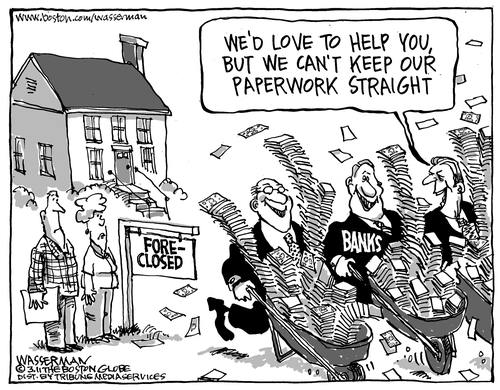Disregard all cheery news you hear from the MSM that the housing crisis is over and housing prices are stable and on the rise. It’s not over. We are still bailing out the banks over the troubled homeowner.
“The evidence is overwhelming: home prices are anything but stable.”
Michael Olenick: Still Looking for a Housing Bottom
Two trends are apparent. One is that banks are delaying foreclosures, or not foreclosing at all despite long-term delinquencies. The other is that private equity firms – flush with cash thanks to Tim Geithner’s religious devotion to trickle-down economics and the resulting cascade of corporate welfare – have been bidding up and holding foreclosed houses off the market. These two factors have artificially limited supply and, combined with cheap mortgages rates, driven up prices. While we can debate whether these strategies represent the best public policy, these policies are obviously not long-term sustainable. [..]
Holding back inventory means that the houses that are put on offer sell faster and at higher prices. That creates an incentive to delay foreclosures or not foreclose at all even when a home is delinquent. Though this seems obvious, the mainstream housing finance community – aided by a freelance “housing analyst,” – uses the faster figures to somehow prove banks are not holding houses. [..]
Besides lower foreclosure activity, the government is going all out to give away houses to private equity firms. Recently Fannie Mae sold 275 properties across metro Phoenix in one sale to a mystery buyer, according to a report by Catherine Reagor of the Arizon Republic. [..]
Anybody who has been a landlord seems to quickly tire of it so, assuming there isn’t a pending planned mass immigration to Phoenix, these investors will eventually want to cash out by selling these houses. Further, they will want to minimize maintenance expenses while they are renting out these houses, so the eventual sale of these houses will increase supply and prolong the housing crisis. Geithner’s policy of shaking down Main Street to help Wall Street continues to hurt your street. [..]
Taking account of the delayed foreclosures and the beginning of mass purchases of houses would mean there should be a surge in home prices, but we’re still seeing little movement in many areas. This is especially puzzling given how inexpensive mortgage are. [..]
Of course, this assumes that people can get mortgages for these houses, though many can’t. Young people especially are hopelessly in debt thanks to out-of-control tuition hikes predictably caused by equally out-of-control student loan policies. [..]
Thanks to low lower foreclosures, real-estate speculators buying in bulk, and low interest rates there is enough direct and anecdotal evidence to suggest that we may be seeing a real-estate recovery on paper. Further, these policies are clearly calibrated to bring about a bubble, despite that bubbles are difficult to control and are not, by definition, sustainable: they always eventually pop. Let’s at least hope that when this bubble bursts the new Wall Street bulk buyers are treated with the same ruthless “free market” vigor that the prior owners of these houses were treated with after the last bubble burst. However, I doubt the mystery Asian money buyer, that Fannie sold Phoenix to, will ever be subject to something like the rocket docket.
Washington’s Blog goes down the list of evidence that “the government’s “Homeowner Relief” Programs are disguised bank bailouts … not even AIMED at helping homeowners. It’s a fascinating piece with all the links to this sham.
Former special inspector general overseeing TARP Neil Barofsky (@neilbarofsky) joined Up w/ Chris Hayes to talk about his book “Bailout: An Inside Account of How Washington Abandoned Main Street While Rescuing Wall Street.” Along with panel guests Heather McGhee (@hmcghee), vice president of policy and research at the progressive think tank Demos; Josh Barro (@jbarro), who writes “The Ticker” for Bloomberg View; Michelle Goldberg (@michelleinbklyn), senior contributing writer for Newsweek/Daily Beast; and Up host Chris Hayes (@chrislhayes), Barofsky shares his thoughts on the failure of TARP and the housing crisis.

 Not only did they go native, they were hand picked by the same bank CEO’s that sit on the Federal Reserve board of directors. This is great article of how that works from Prof William K. Black, associate professor of economics and law at the University of Missouri-Kansas City, who explains some more of the reasons the TBTF banks need to be broken into smaller pieces.
Not only did they go native, they were hand picked by the same bank CEO’s that sit on the Federal Reserve board of directors. This is great article of how that works from Prof William K. Black, associate professor of economics and law at the University of Missouri-Kansas City, who explains some more of the reasons the TBTF banks need to be broken into smaller pieces.
Recent Comments